Rebecca Thorne (she/her) is an author of all things fantasy, sci-fi, and romantic, such as the Tomes & Tea series. She thrives on deadlines, averages 2,700 words a day, and tries to write at least 3 books a year. (She also might be a little hyper-focused ADHD.) After years in the traditional publishing space, Rebecca pivoted into self-publishing. Now, she’s found a happy medium as a hybrid author, and leans into her love of teaching by helping other authors find their perfect publication path. When she’s not writing (or avoiding writing), Rebecca can be found traveling the country as a flight attendant, or doing her best impression of a granola-girl hermit with her two dogs. She’s always scheming to move to a mountain town and open a bookshop that serves tea.
I had the opportunity to interview Rebecca, which you can read below.
First of all, welcome to Geeks OUT! Could you tell us a little about yourself?
It’s such a pleasure to be here!! I’m Rebecca Thorne, a writer of all things fantasy, sci-fi, and romance. My books usually feature LGBTQIA+ representation, and are known for their witty dialogue and fast-paced writing style. When I’m not writing, I’m touring the country as a flight attendant—which has been my day job for over a decade. J
What can you tell us about your latest book, Can’t Spell Treason Without Tea? What was the inspiration for this story?
This is so wild to see such a reception for this book. I wrote Can’t Spell Treason Without Tea after happening upon Travis Baldree’s Legends & Lattes in a Barnes and Noble—back when it was self-published. Aside from it being the exact story I needed at that time in my life—cozy, quaint, low stakes—it opened my eyes about the movement self-publishing has had on the industry. Before that day, I didn’t realize indie books could be in Barnes and Noble.
The actual story of Treason and Tea had been lurking in my mind for years. I wanted to write two women opening a coffee shop on the edge of a frozen tundra. Early iterations involved them serving adventurers who ventured into Dragon Country looking to steal from dragon hoards—but of course, it had higher stakes, because cozy fantasy wasn’t really around back then. When I found L&L, it made it easy to adapt this idea into something quieter!
As a writer, what drew you to the art of storytelling, specifically speculative fiction and romance?
I’ve been writing since I was 11, so by this point I’ve experimented with most genres. I’m a romantic at heart, so everything I write has some element of romance—it’s a safe place to observe those dramatic love stories without risking my own feelings. LOL.
I actually spent a lot of time writing contemporary when I was young. I used it to get a hang of the mechanics of writing and storytelling, without the chaos of creating a whole new world. Fanfiction was also a big driver in my writing development; taking someone else’s characters and setting, and creating fresh plots gave me the chance to really fine-tune my writing style without pressure.
Nowadays, I thrive on creating new worlds! Fantasy grabbed me about four years back, and hasn’t let go. J
How would you describe your writing process?
I’m all about efficiency. Treason and Tea was my fifteenth book, and on a slow year, I write 2 novels. On a good year, like in 2023, I write 5. I use a 5 Sentence plotting method to ensure my books have goalposts I can meet, and that gives me the freedom to discover everything in between those five sentences. But I tie word count goals to those plot events, and that helps keep my pacing on track!
Basically, it takes me about 3 – 6 weeks to draft a new book, and when I’m really moving, I can write 10,000 words in a day. That’s a big reason why I do both traditional publishing and self-publishing; I have so many books that it just makes sense to release some of them on my own. J
If you’re interested in learning more about my writing method, you can check out the craft book I published in December 2023: The 5 Sentence Method: How to Write Your D*mn Book, Already. It’s a lot of fun, haha!
Growing up, were there any stories in which you felt touched by/ or reflected in? Are there any like that now?
My childhood was defined by fantasy classics like Patricia C Wrede and Tamora Pierce. I always adored the quartet idea from Tamora Pierce, so I’m thrilled that Can’t Spell Treason Without Tea is the start of my very own quartet!
These days, I’m reading almost exclusively sapphic fiction and diverse stories, since I grew up with straight, white protagonists. I’m thrilled we have so many great options to show LGBTQIA+ love stories, and that we’re seeing PoC and ND characters taking center stage. Gimme all the representation!
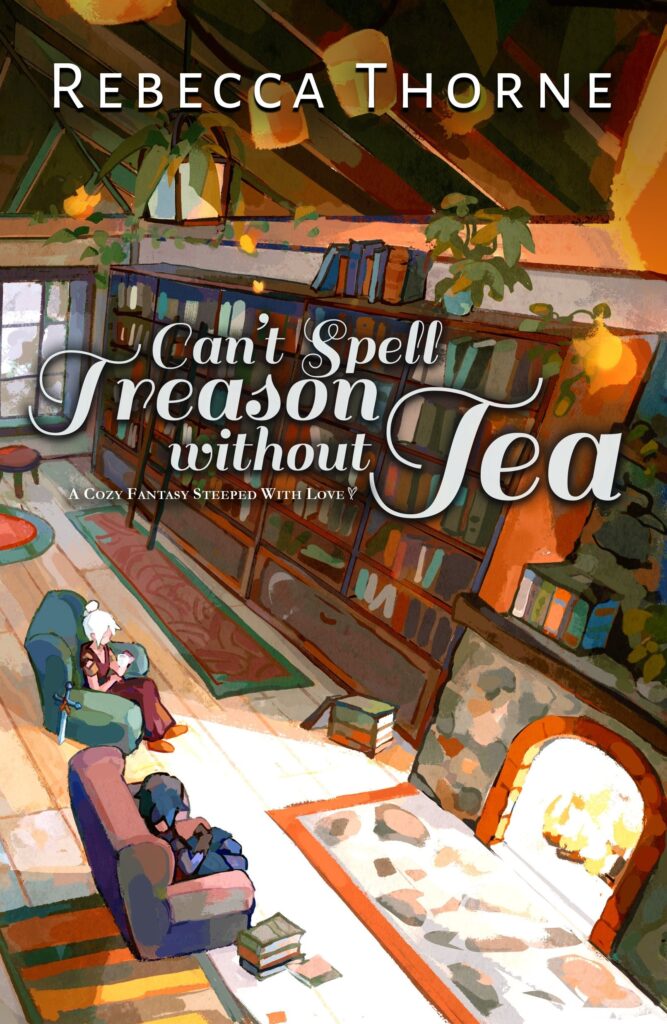
As a writer, who or what would you say are some of your greatest creative influences and/or sources of inspiration in general?
Ally Carter was one of my most formative authors. Back in high school, I remember reading her spy series; I’d finish the books the day they were released, and then re-read it immediately with an eye for how she hooked me for so long. Her quick-witted banter and easily-consumable writing style really stuck with me, and paved the way for my own writing.
My goal was always to be like those books: simple, easy to read, vastly enjoyable. These days, I add more intense themes into some of my books, but that goal never wavers. I always want my books to be as approachable as possible!
What are some of your favorite elements of writing? What do you consider some of the most frustrating and/or challenging?
Dialogue is my absolute favorite. When I find two characters with chemistry, I love the way they can just fly off the page with their snark and humor. Adding puns for Kianthe really lightened the whole of the Tomes and Tea quartet, and made it an absolute pleasure to return to that world over and over.
As for challenging… I think I fall into the trap of boring conversation sometimes. I rely so heavily on dialogue to make my stories unique that I forget there’s actions outside of their words. So, if I’m not careful, I’ll wind up with a lot of eyebrow raising, smirking, laughing, etc. When I notice this happening, I try to add some kind of background activity—the characters making tea, or stocking a bookshelf, etc—just to keep things more interesting on every level. It… doesn’t always work. LOL.
Many authors would say one of the most challenging parts of writing a book is finishing one. What strategies would you say helped you accomplish this?
See the 5 Sentence Method above. In my opinion, half of the struggle in finishing a book is knowing how it ends—and if that isn’t mapped out, it’s a lot more effort to sit down and get it done.
Another issue I ran into when I was young is hopping from book to book. I would write 30k words, then get a shiny new idea and be convinced that was a better use of my time. Rinse, repeat. I finally realized when I was 23 or so that if I did that forever, I’d never accomplish my dream of being published, because you can’t publish an unfinished book.
Nowadays, when a new idea catches my interest, I write it down in Scrivener, then keep it in my brain and remain focused on my current project. Once that one is done, the new idea is my reward. It’s a much more sustainable option for me. LOL.
Aside from your work, what are some things you would want others to know about you?
I… I don’t know. I love teaching publishing and writing—that’s my biggest passion in life, other than writing my own books. So, if you’re interested in learning more about that, find me on my socials—TikTok, Instagram, Facebook, etc—because I answer questions all the time!
If I had to pick a fun piece of trivia, it’s that I failed an FBI polygraph… twice. >.>
What’s a question you haven’t been asked yet but that you wish you were asked (as well as the answer to that question)?
What’s the best book you’ve ever written?
My answer is definitely The Day Death Stopped. No one seems to know about this book, which is a damn shame, because I really stretched my writing abilities for it. It uses footnotes and omniscient narration to follow 3 stories, one of which is told in reverse. The first chapter of the book is literally the book’s ending, so it’s honestly the culmination of all my writing. AND I somehow snagged Moira Quirk to narrate it. Go check it out, please; I adored it.
What advice might you have to give for other aspiring writers?
Don’t quit your day job. Better yet, find a day job you don’t absolutely loathe, get yourself happy outside of publishing, and THEN focus on getting that six figure book deal. Publishing is a business of rejection, so if you’re hoping some massive book deal will scoop you out of your misery, you’ll be disappointed over and over. I’ve watched those authors turn more and more desperate, and everyone around them suffers.
Find a job you like well enough. Then go towards your dream of publishing. It will lighten the pressure you put on yourself so much.
Are there any other projects you are working on and at liberty to speak about?
I’m always working on something! My newest idea is a cozy sci-fi that follows a doctor and a soldier on an edge-of-space station. It’s going to have adventure and coffee that makes someone immortal and space farmers markets and a great, adorable love story. I can’t wait!
Finally, what LGBTQ+ books/authors would you recommend to the readers of Geeks OUT?
This is How You Lose the Time War (Amal El-Mohtar and Max Gladstone)is one of my all-time favorites! I reread it at least once a year; it’s so unique, and has gorgeous prose. Otherwise, I’m reading Bluebird (Ciel Perlot), which is a very fun sci-fi romp about an ultra-intelligent engineer trying to keep weapon schematics out of an evil faction’s hands. Next on my list is the Honey Witch (Sydney J. Shields), which I’m confident will sweep me off my feet—it’s Bridgerton, if Penelope discovered she was a witch and relocated to a magical island. Can’t wait!

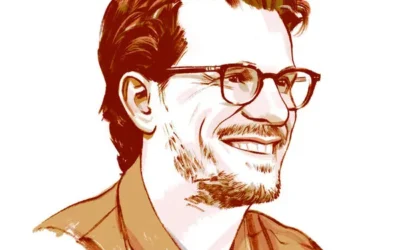
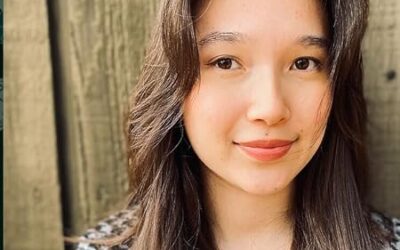
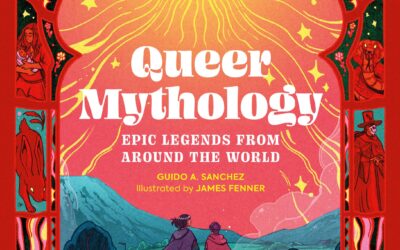
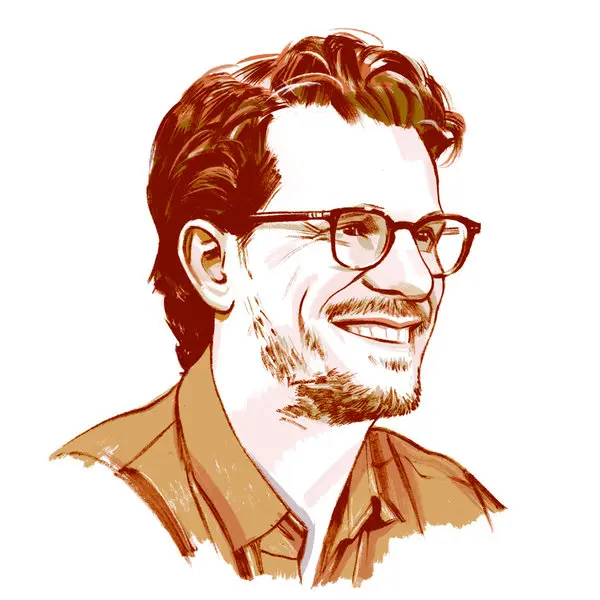
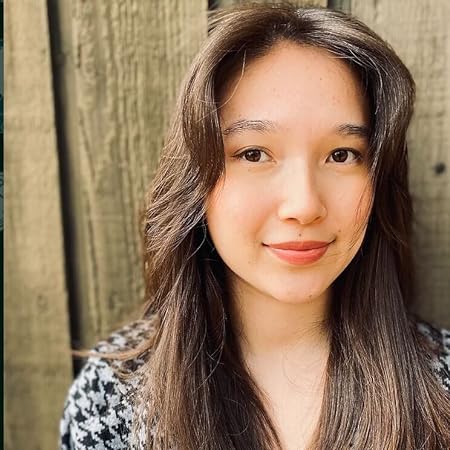
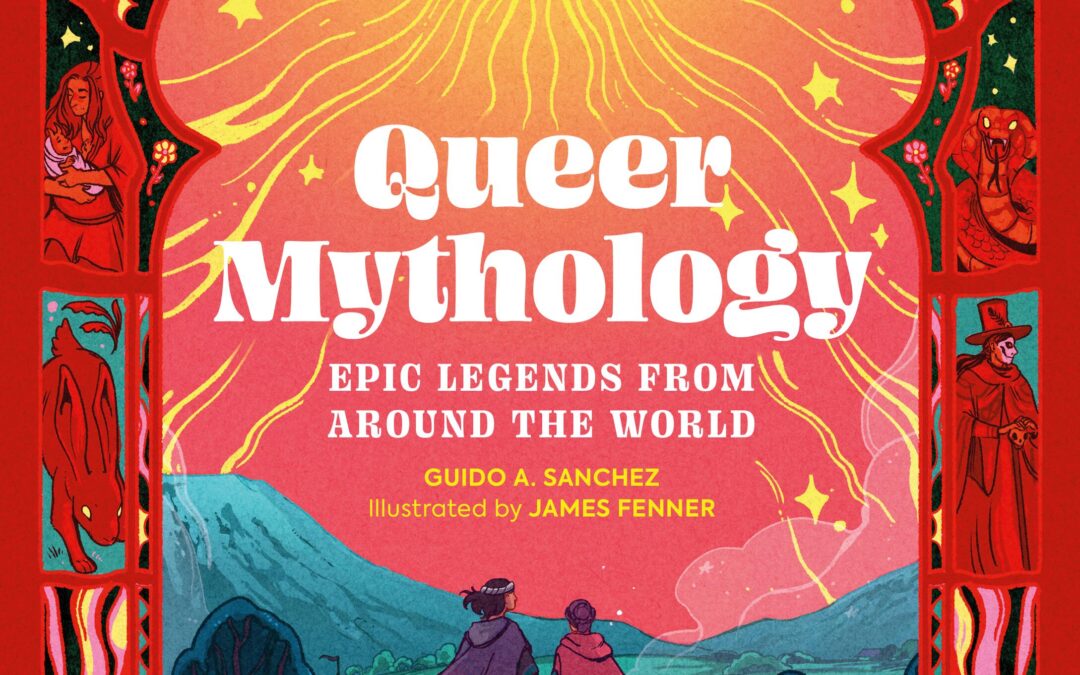
0 Comments